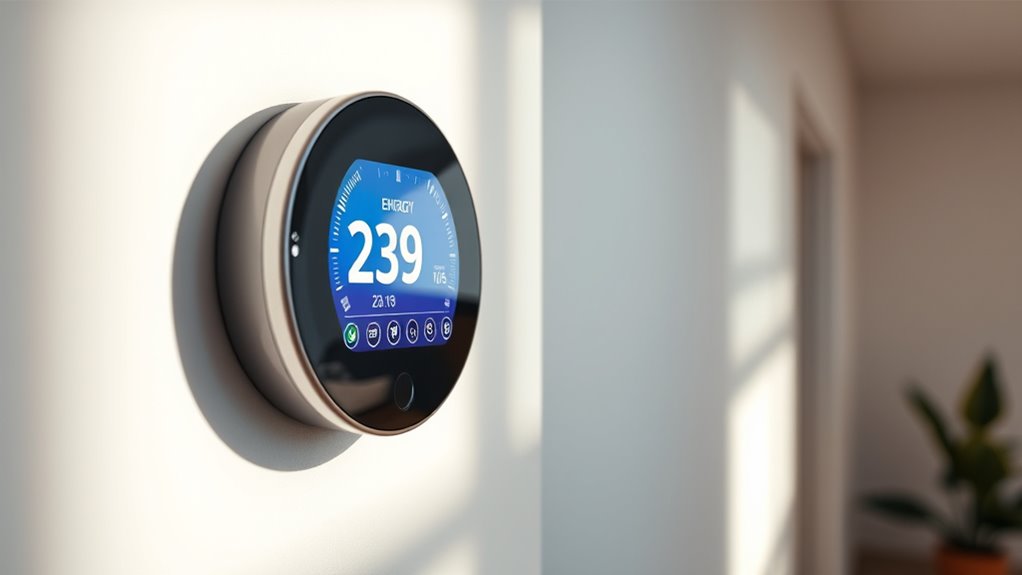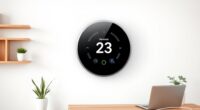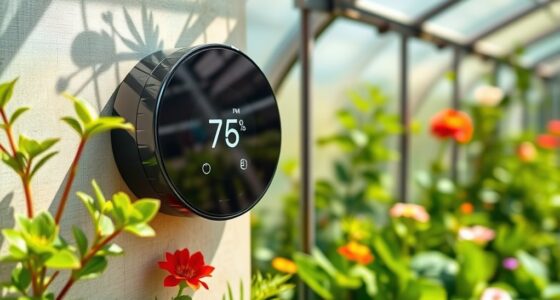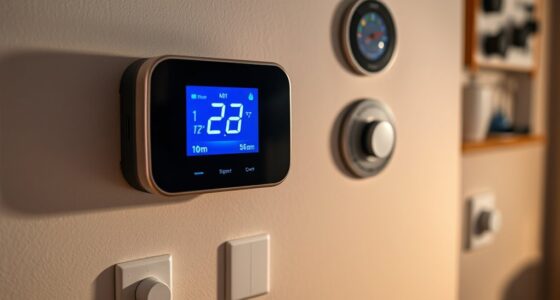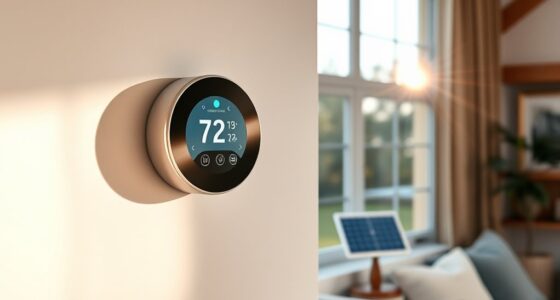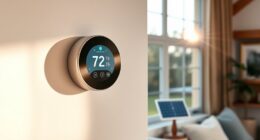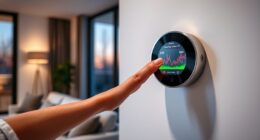When selecting a thermostat with energy usage reports, look for one that offers real-time data, detailed charts, and smart features like remote control via Wi-Fi or smartphone apps. Choose models that learn your schedule, suggest energy-saving tips, and integrate with home automation systems for automatic adjustments. These features help you closely monitor your energy consumption, identify inefficiencies, and cut costs while lowering your carbon footprint. Keep exploring to discover how to make the most of these powerful tools.
Key Takeaways
- Ensure the thermostat provides detailed energy consumption reports with clear charts and insights.
- Look for Wi-Fi connectivity and smartphone control for remote monitoring and adjustments.
- Prioritize devices with learning capabilities that adapt to your schedules for optimal efficiency.
- Check if the thermostat offers easy-to-understand reports to track and analyze energy usage trends.
- Select models with automation features to set energy-saving rules during vacations, nights, or absences.
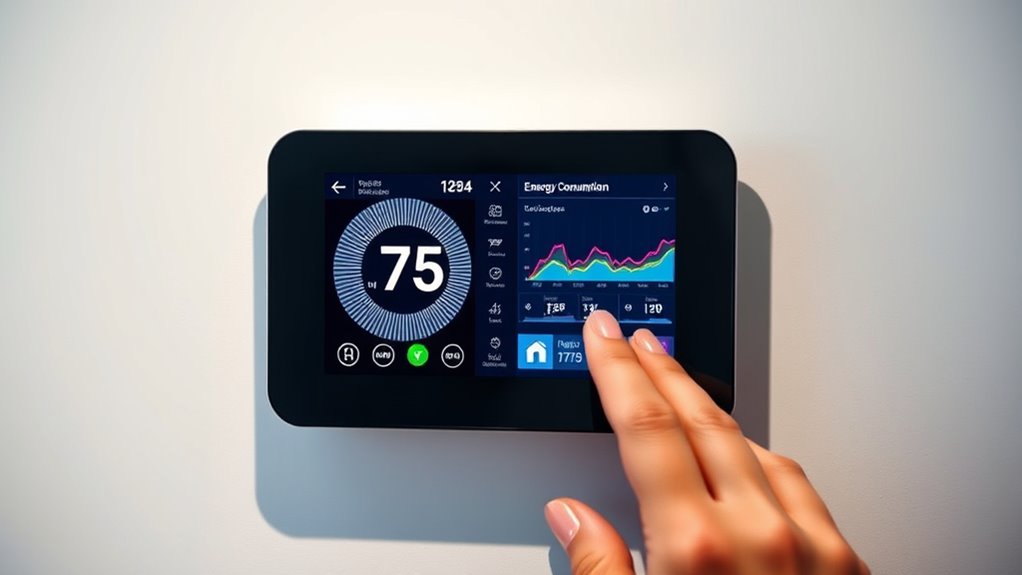
Choosing the right thermostat can substantially impact your energy bills, especially when it provides detailed energy usage reports. These reports give you a clear picture of how much energy your heating and cooling systems consume, allowing you to identify patterns and make smarter decisions. When selecting a thermostat with energy reports, look for one that offers real-time data and thorough analysis. This way, you can see exactly when and how your energy consumption spikes and adjust your habits accordingly. Smart features, such as Wi-Fi connectivity and smartphone control, make it easier to monitor and manage your energy use from anywhere, giving you greater flexibility and control.
Modern thermostats with energy reports often come equipped with smart features that enhance their usefulness. For example, some models learn your schedule and preferences over time, automatically adjusting the temperature for maximum efficiency. Others offer detailed charts and insights, so you can track your energy consumption trends over days, weeks, or months. This data helps you spot inefficiencies—like heating or cooling when nobody’s home—and make targeted changes. Many smart thermostats also integrate with home automation systems, allowing you to set rules that reduce energy waste automatically, such as lowering the temperature during vacation or at night. Additionally, energy conservation is a key benefit of these devices, helping reduce your carbon footprint while saving money.
Smart thermostats learn your schedule and optimize efficiency automatically.
Additionally, choosing a thermostat with energy reports can motivate you to adopt more energy-conscious habits. Seeing the tangible impact of your adjustments in real time makes it easier to stay committed to lowering your utility bills. For example, you might notice that turning down the thermostat by a degree or two during the day saves a significant amount on your energy bill. With detailed reports, you can verify whether these small adjustments add up, giving you confidence in your choices. Some models also provide personalized tips based on your energy consumption patterns, helping you optimize your system’s efficiency without sacrificing comfort.
Furthermore, these thermostats often come with features that make energy management more intuitive. User-friendly interfaces, easy-to-understand reports, and remote access via mobile apps empower you to stay on top of your energy use. As a result, you don’t have to guess whether you’re wasting energy—you’ll see it clearly and act accordingly. Over time, the insights gained from energy reports enable you to fine-tune your heating and cooling schedules, ultimately reducing costs and minimizing your environmental impact. In short, selecting a thermostat with detailed energy usage reports and smart features puts the power in your hands to make smarter, more efficient choices for your home.
Frequently Asked Questions
Do All Smart Thermostats Support Energy Usage Reporting?
Not all smart thermostats support energy usage reporting. When choosing a thermostat, you should check its smart thermostat features to guarantee it provides detailed energy data. Keep in mind that data privacy is essential; verify how your info is stored and shared. If energy reports matter to you, select a model that clearly offers this feature, so you can monitor your consumption and save energy effectively.
Can Energy Reports Be Customized for Specific Time Periods?
Yes, you can customize energy reports for specific time periods, giving you control like a maestro conducting a symphony. Most smart thermostats with energy reports allow for custom report customization, letting you adjust time periods to see detailed insights. You simply select your desired dates or duration, and the system generates tailored reports. This flexibility helps you understand your energy usage better and optimize your thermostat settings efficiently.
How Accurate Are the Energy Consumption Estimates?
Energy consumption estimates are generally quite accurate, but accuracy concerns do exist due to reporting limitations. Your thermostat’s sensors and algorithms might not capture every detail perfectly, which can lead to slight discrepancies. Keep in mind that factors like device calibration, installation, and environmental changes can affect data quality. While these reports provide valuable insights into your energy use, don’t rely solely on them for precise measurements—use them as helpful guides rather than absolute facts.
Do Energy Reports Include Comparisons With Similar Households?
While some energy reports offer household comparisons, many maintain your privacy through data anonymization, so you won’t see exact details. Instead, they provide a general sense of how your energy use stacks up against similar households. This way, you get useful insights without compromising your privacy. Keep in mind, the level of detail varies by device, so check if your thermostat includes household comparisons for a clearer picture.
Are There Privacy Concerns With Sharing Energy Data?
Yes, there are privacy concerns with sharing energy data. When you enable data sharing, your usage details could be accessed by third parties, raising questions about privacy and security. To protect yourself, review the thermostat’s privacy policies and control settings. Always opt-in carefully, and consider limiting data sharing to trusted sources. Being aware of these concerns helps you balance benefits with safeguarding your personal information.
Conclusion
Choosing a thermostat with energy usage reports is like giving your home a trusted advisor, guiding you toward smarter decisions and savings. It’s the key to revealing hidden opportunities to cut costs and reduce your carbon footprint. With this tool in your corner, you’re steering your energy habits like a skilled captain steering calm waters. Embrace the power of informed choices, and watch your energy efficiency blossom like a well-tended garden.
